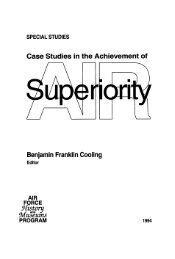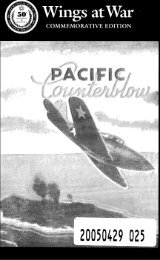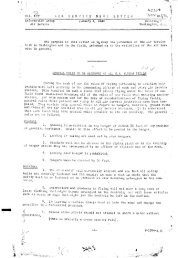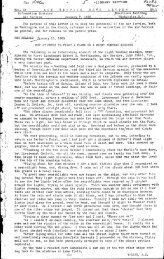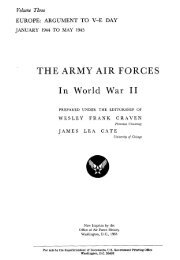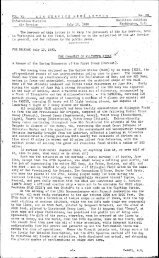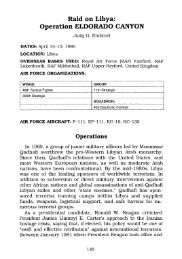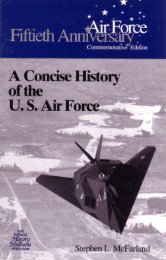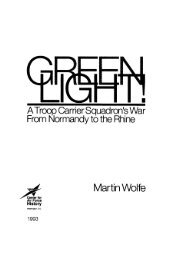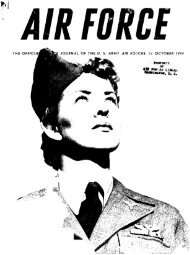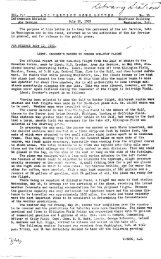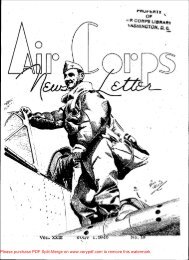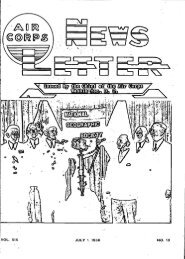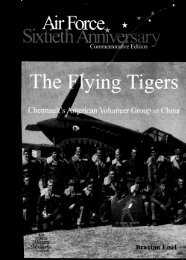News Letter 1941 Jul-Dec - Air Force Historical Studies Office
News Letter 1941 Jul-Dec - Air Force Historical Studies Office
News Letter 1941 Jul-Dec - Air Force Historical Studies Office
Create successful ePaper yourself
Turn your PDF publications into a flip-book with our unique Google optimized e-Paper software.
t '<br />
J 1. '<br />
~! ItIf<br />
THE AIR FORCESNE",S LETTER<br />
The Newfoundland <strong>Air</strong> Base is set down right in<br />
the middle of such country. The nearest town is<br />
Grand Falls, a little community of about 6,000<br />
people, about 65 miles away. It can be reached<br />
only by amphibian or on the narrow-gauge Newfoundland<br />
Railroad, on which a train goes from the base<br />
to the town one day and returns the next, taking<br />
approximately three and one-half hours for ,the oneway<br />
journey. There are no roads of Rny sort, except<br />
on the airport itself. All the trucks and<br />
other motor vehicles had to be brought in by train<br />
and will have to be taken out again in the same<br />
manner. A five-minute walk in any direct ion brings<br />
the f1ikerup aga Inst a wall of vegetation or swaznpy<br />
ground. There are two roads leading down to Gander<br />
Lake, about a mile and a half away, and several<br />
other roads which wander out into the bush a mile<br />
or so and then come to an abrupt halt. Consequently,<br />
private automobiles are completely useless<br />
even if the limited railroad facilities could be<br />
used to bring them to the base.<br />
The climate isn't particular ly pleasant, al though<br />
there are some beautifully clear days and nights<br />
to compensate for some of the unpleasant weather.<br />
It rains and blows a lot in the summer, and the<br />
snowfall is heavy in the winter. An average of 15<br />
feet of snow during a winter is not uncommon, and<br />
the natives say that there are five or six feet of<br />
snow on the ground all the time during the cold<br />
months, with drifts ranging from 15 to 20 feet deep,<br />
The winter season ranges roughly from November 1<br />
to May I, although frequently there is snow both<br />
before and after those dates.<br />
The temperature ranges from as high as 85 degree<br />
s (F) during the shor t Stmne I' to as low as 30<br />
degrees below 0 during the long winter. In the<br />
sunmer some nights are stuffy and muggy, but during<br />
most of what we call the summer months it is distinctly<br />
chilly and damp, especially at night, if<br />
not downright cold. Fogs are frequent, caused by<br />
the meeting of the Arctic Current and the Gulf<br />
Stream a short distance off the Newfoundland Coast.<br />
During August, when the writer was there, the<br />
weather was cold and rather rainy--cold enough for<br />
woolen shirts and leather jackets during the day,<br />
blouses and trench coats at night.<br />
Lnc j den t a Ll y , there is a maximum of about 19<br />
hours of daylight daily during the height of the<br />
summer (June) and of about 18 hours of darkness in<br />
late <strong>Dec</strong>ember and January. When we were there,<br />
there were about 16 or 17 hours of daylight. The<br />
last motion picture show went on at 9 P,M. Newfoundland<br />
time (11:30P.M, Greenwich Mean Time, on<br />
which the air base operates) and darkness did not<br />
come for at least half an hour after that time.<br />
<strong>Office</strong>rs assigned to the base should take with<br />
them plenty of winter clothing. The winter uniform<br />
is specified, in fact, and cotton clothing is<br />
not authorized. Trench ,coats are a necessity, be-<br />
6<br />
cause of the heavy rainfall, and both overshoes<br />
and mackinaws are needed. Leather or flying jacke ts<br />
are worn until supper calion weekdays and before<br />
noon on Sundays, after which time all officers are<br />
required to wear blouses.<br />
Most of the officers work in Gl slacks, which<br />
they purchase from the well-equipped Quartermaster<br />
stores, saving their more fragile and easily soiled<br />
pinks for special occasions. Similarly they wear<br />
heavy GI shoes, since there are no sidewalks to<br />
speak of and the soil (a curious conbination of<br />
roots, rocks, shale and earth) wreAks havoc with<br />
..'city" footgear. Civilian clothing isn't of much<br />
use, and is not authorized at all on the base. It<br />
is likely to take up more precious storage space<br />
in quarters than it is worth.<br />
Laundry facilities at present are extremely limited<br />
and poor, although a Government laundry undoubtedly<br />
will be provided as quickly as pnssible,<br />
and enough shirts, underwear and the like should<br />
be taken along to last two or t hree weeks wi ;;,out<br />
replacement. The nearest "modern" laundry is at<br />
Grand Falls, and the prices are about t h ree times<br />
what they are in the States. Theoretically, the<br />
laundry goes to Grand Falls one week and comes<br />
back the next; actually it takes about three weeks.<br />
Since it costs 30~ to get a Gl shirt washed,<br />
most of the enlisted men and some of the officers<br />
do their own. Mos t of the off icers wash their own<br />
underwear, handkerchiefs and socks and the shower<br />
rooms in the officers' quarters usually are cluttered<br />
at night with lines filled with drying garments.<br />
Dry cleaning is expensive and unsatisfactory.<br />
An enlisted man has set up a drycleaning<br />
and tailoring establishment in the Post Exchange,<br />
charging 1St to clean a shirt and 25~ for a Llous e ,<br />
but his services are somewhat amateurish and not<br />
recommended for expensive uniforms. Some officers<br />
bring their uniforms to the States, when they come<br />
dawnoncross-country flights, and get them cleaned<br />
during their stay.<br />
Recreational facilities are somewhat limited at<br />
the present time. The Army Motion Picture Service<br />
presents movies every night in a tent theater,<br />
and the choice of pictures is usually good, but<br />
there are more customers--including canadian officers<br />
and enlisted men and civilian supervisors on<br />
the construction projects--than there is space for<br />
them. There is a small but excellent library, of<br />
about 150 volumes, obviously chosen by someone of<br />
very good taste.<br />
The enlisted men have a recreation room, which<br />
had not been turnished completely when the writer<br />
was there, in which there were ping pong tables<br />
and dart boards. Adjoining the recreation room<br />
waS the PX-operated canteen' The PX officer ~ncourages<br />
the purchase of canned orange, ta~ato and<br />
grapefruit juice, chocolate bars and other such<br />
food and drink that goes over on the luxury side



